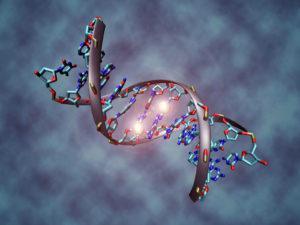
Epigenetic modification: a possible influence on allergy and asthma (Christoph Bock, Wikimedia Commons)
A recent review evaluated current findings on multigenerational studies of allergy and asthma, where atypical immunological traits may be passed down generations through epigenetics. Multigenerational cohorts where subjects are observed starting from pregnancy allows researchers to detect mechanisms of development without the interference of treatment or environment. There has been an abundance of research conducted across generations, where several terms are introduced: multigenerational, transgenerational, intergenerational, and cross-generational – all which involve the passing of traits to another generation through epigenetics.
Epigenetic influence has become increasingly shown to contribute to one’s health. Epigenetics is believed to effect one’s genetic susceptibility to IgE antibodies, or atopy. Atopy has been found to be influenced by developmental programming, including mother-fetal transmission. Most commonly, maternal exposure to certain nutrients or pollution has a direct prenatal effect on the fetus. However, it is speculated that maternal exposure has the ability to affect the fetal germline as well. Moreover, parental and grandparental environmental exposures have been shown to affect the growth and development of children and grandchildren. Arshad et al. discusses the variety of multigenerational cohorts, but explains how there is a lack of association between findings, generational transmission, and human disease. However, authors do highlight studies that demonstrate a strong potential to investigate epigenetics.
Researchers showcase many epigenetic studies including the French E3N Study, where nearly 100 000 female subjects were enrolled and examined BMI, exercise, smoking and their effects on asthma. The subjects’ children and grandchildren are now recruited for a follow-up E4N study to continue examining environmental risk factors and effects that may span across generations. The Isle of Wight cohort also involved three generations and has been an ongoing study for the past 27 years. Children were assessed through environment, genetics, and epigenetics, whereas grandchildren have additional assessments of gene expression and microbiome analysis. This study examines the impact of epigenetics on allergic diseases, including asthma and eczema. Animal models have also been used to depict transgenerational transfer of the asthmatic phenotype. However, it is noted that animal studies often do not measure effects of a greatgrandchild (F3) generation and are limited to the grandparental-parental-child (F0-F1-F2) transmission.
Researchers suggest that more robust data is needed for human studies, including measuring changes in DNA methylation and considering sex-specific effects. There are many studies investigating multigenerational lifestyle factors that may affect health, but there has not been a large focus on the epigenetic effect on allergy and asthma among generations.
Journal Article: Arshad et al., 2017. Multigenerational cohorts in patients with asthma and allergy. Journal of Allergy and Clinical Immunology.
Article by Rebecca Ng











